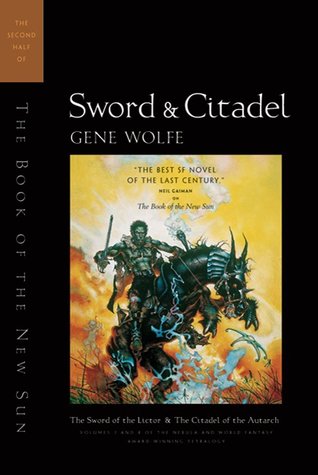More on this book
Community
Kindle Notes & Highlights
She had said that I, who had worn fuligin since my elevation to journeyman, and gray rags before that, was dressed in bright clothing.
One ought to drink, I think, when one is cheerful already. Otherwise nothing but more sorrow is poured into the cup.”
worlds where there was no currency but honor,
I could not be certain whether their shapes had been intended as works of art or as parts for strange machines, and it may be indeed that among some of those unfathomable peoples there is no distinction.
I felt that some mysterious life, old and strange, yet kindly too, had come to the very moment of revealing itself to me, then drawn away like some immensely eminent person, a master of the musicians, perhaps, whom I had struggled for years to attract to my door but who in the act of knocking had heard the voice of another guest who was unpleasing to him and had put down his hand and turned away, never to come again.
Master Severian.”
A dog is born a dog and a bird is born a bird, but to become a human being is an achievement—you have to think about it.
He spoke the long word that is our universe,
Then the mountain rose before us, too near for us to see it as the image of a man. Great folded slopes rolled down out of a bank of cloud; they were, I knew, but the sculptured drapery of his robes. How often he must have risen from sleep and put them on, perhaps without reflecting that they would be preserved here for the ages, so huge as almost to escape the sight of humankind.
I know of no thought more terrible than this. (That of my own death, which is popularly supposed to be so awful as to be inconceivable, does not much trouble me; it is of my life that I find, perhaps because of the perfection of my memory, that I cannot think.)
It is impossible, I think, that all the symbols we see in natural landscapes are there only because we see them. No one hesitates to brand as mad the solipsists who truly believe that the world exists only because they observe it and that buildings, mountains, and even ourselves (to whom they have spoken only a moment before) all vanish when they turn their heads. Is it not equally mad to believe that the meaning of the same objects vanishes in the same way?
“That is so. Every man fights backward—to kill others. Yet his victory comes not in the killing of others but in the killing of certain parts of himself.”
It would swell my self-esteem now to write that I had consented to lead this little army out of a feeling of responsibility and concern for their plight, but it would not be true.
I knew that there is an all-pervasive power in the universe of which every other is the shadow. I knew that in the last analysis my conception of that power was as laughable (and as serious) as Oannes. I knew that the Claw was his, and I felt it was only of the Claw that I knew that, only of the Claw among all the altars and vestments of the world.
And the secret is only that we torturers obey.
No one truly obeys unless he will do the unthinkable in obedience; no one will do the unthinkable save we.
I was acutely conscious, as I spoke, of the eviscerated woman mumbling beneath her glass somewhere behind me, a thing that once would not have bothered the torturer Severian in the least.


